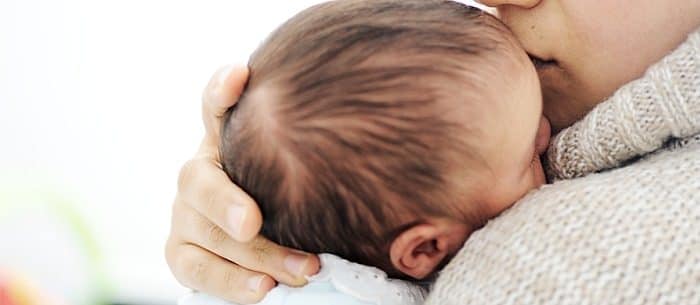Baby hiccups can be cute — for about 30 seconds. But once those hiccups keep coming and coming with no end in sight, “cute” can turn to “concern” as you wonder if they’ll ever stop. Though most bouts of hiccups are harmless, it’s important to learn what’s normal and when it’s time to talk to your baby’s doctor.
Learn what causes hiccups, what steps you can take to reduce them and how to prevent baby hiccups in the future.
Baby hiccup causes
There are several things that may set off a bout of hiccups in your baby, according to Dr. Ashanti Woods, an attending pediatrician at Mercy Medical Center. Causes may include “overeating, sudden excitement and air swallowing,” he says. “Most babies will have hiccups after each feed — this can be upwards of three to four times a day.” But in most cases, there is no cause at all. “Hiccups are normal involuntary spasmodic contractions of the muscles of the inner and outer chest. Occasional hiccups are normal,” he adds.
When can you expect the most cases? “Hiccups are most likely to impact newborns. After baby’s first month, the frequency of hiccups should decrease,” says Dr. Varuna Tuli, a pediatrician at Franciscan Hospital for Children. In fact, hiccup fits can happen before your little one is even born. “Some moms can feel them and they may resemble the feeling of small kicks or flutters, and typically happen at regular intervals like a hiccup does,” says Dr. Tuli.
How to treat hiccups
Even though hiccups are a normal occurrence for babies, they’re still no fun. Luckily, most cases of baby hiccups go away on their own. However, there are a few things you can do to get rid of them faster. Back pats are helpful, says Dr. Woods. And don’t forget to try getting any gas out. After a feeding, sit your baby upright on your lap and burp him. “Burping your baby frequently should alleviate some of the stomach gas,” adds Dr. Tuli.
According to the American Academy of Pediatrics, changing your baby’s position can help quell hiccups that start up during a feeding. If they don’t go away on their own, resuming feeding for a minute or two may get rid of them. To prevent them next time, don’t wait until your baby is overly hungry for a feeding. Instead, feed him when he’s relaxed to reduce the amount of air he swallows while eating.
When to see a pediatrician
If your baby’s hiccups are lasting longer than normal or occurring too often, it might be time to visit the doctor. “A baby should be seen by a pediatrician if the length of the bout of hiccups is more than 20 minutes,” says Dr. Tuli. “If that length of time is a regular occurrence, then the pediatrician may want to evaluate the baby for reflux.” Dr. Woods adds that a doctor should be called if the hiccups become severe. “Sustained or persistent hiccups that interrupt breathing are not normal,” he says.
* This article is for general informational purposes only. It is not intended nor implied to be providing medical advice and is not a substitute for such advice. The reader should always consult a health care provider concerning any medical condition or treatment plan. Neither Care.com nor the author assumes any responsibility or liability with respect to use of any information contained herein.




